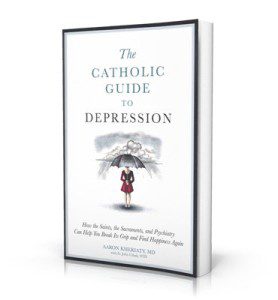What comes to mind when you read the word depression?
Let’s take a look at the definition:
: a state of feeling sad
: a serious medical condition in which a person feels very sad, hopeless, and unimportant and often is unable to live in a normal way
Now, let’s look at some stats:

 Hard to believe that one in TEN people are affected by some form of depression, considering it is still quite the taboo topic, often spoken about in hushed tones or with an undercurrent of shame. In The Catholic Guide to Depression: How the Saints, the Sacraments, and Psychiatry Can Help You Break Its Grip and Find Happiness Again, Dr. Aaron Kheriaty does an excellent job at breaking down depression into three helpful categories: the spiritual, the medical, and the psychological.
Hard to believe that one in TEN people are affected by some form of depression, considering it is still quite the taboo topic, often spoken about in hushed tones or with an undercurrent of shame. In The Catholic Guide to Depression: How the Saints, the Sacraments, and Psychiatry Can Help You Break Its Grip and Find Happiness Again, Dr. Aaron Kheriaty does an excellent job at breaking down depression into three helpful categories: the spiritual, the medical, and the psychological.
How many of us have either experienced or known someone who was depressed, perhaps even committed suicide as a result of depression?
If you’re like a good number of folks, you might view depression as a largely one dimensional topic…until it affects you or someone you love. In my personal experience, the illness hit close to home. As I began to search for answers, both medically and spiritually, a friend recommended Dr. Kheriaty’s book and loaned her copy to me. I was hooked. The book did a great job of explaining depression from a Catholic point of view. Finding resources was often difficult; finding Catholic ones even more so. The book covers spiritual, medical, and psychological matters in-depth, which gives the reader a good basis for understanding the disorder, but does not seek to provide cookie cutter answers. If you’ve ever been down the road of depression yourself or with a loved one, you know that the journey itself doesn’t always lend itself to a quick fix answer…unfortunately. Our society is all too quick with its self help books and instant gratification to solving problems. Depression, on the other hand, is multifaceted, and oftentimes takes quite a bit of time and finesse and study unique to the individual to find the right fit for treatment. Our faith is not a religion that provides easy answers or quick fixes to tragic and inexplicable events such as suicide. {p.107}
It takes…patience.
IN THE BEGINNING
Dr. Kheriaty covers the basics of depression: its origin in sin, signs and symptoms to types {psychotic vs. melancholic depression, bipolar depression and substance abuse}, and even going back to its original name, melancholia, and its importance and place in the confessional, the effect of depression on the spiritual life and discerning the provenance of consolation and desolation based on particular circumstances.
Because depression is often the root of suicide, he also talks about suicide with respect to the Catechism, and the nuanced and sensitive teaching of the Church, highlighting CCC 2280-2283
Everyone is responsible for his life before God who has given it to him. It is God who remains the sovereign Master of life. We are obliged to accept life gratefully and preserve it for his honor and the salvation of our souls. We are stewards, not owners, of the life God has entrusted to us. It is not ours to dispose of.
Suicide contradicts the natural inclination of the human being to preserve and perpetuate his life. It is gravely contrary to the just love of self. It likewise offends love of neighbor because it unjustly breaks the ties of solidarity with family, nation, and other human societies to which we continue to have obligations. Suicide is contrary to love for the living God.
If suicide is committed with the intention of setting an example, especially to the young, it also takes on the gravity of scandal. Voluntary co-operation in suicide is contrary to the moral law.
Grave psychological disturbances, anguish, or grave fear of hardship, suffering, or torture can diminish the responsibility of the one committing suicide.
We should not despair of the eternal salvation of persons who have taken their own lives. By ways known to him alone, God can provide the opportunity for salutary repentance. The Church prays for persons who have taken their own lives.
 Finding and keeping one’s spirituality through depression can be difficult. Dr. Kheriaty shares some advice in maintaining a spiritual life through depression. He says, “This illness is a trial, a cross, which God allows for reasons that are usually beyond our understanding for now. The Christian faith teaches that this suffering can have redemptive value, if it is united to the suffering of our Lord on the Cross. He has not, and he will not, abandon the person who suffers. In fact, through suffering, a person can become ever more deeply united to Christ and can thereby grow in holiness.”
Finding and keeping one’s spirituality through depression can be difficult. Dr. Kheriaty shares some advice in maintaining a spiritual life through depression. He says, “This illness is a trial, a cross, which God allows for reasons that are usually beyond our understanding for now. The Christian faith teaches that this suffering can have redemptive value, if it is united to the suffering of our Lord on the Cross. He has not, and he will not, abandon the person who suffers. In fact, through suffering, a person can become ever more deeply united to Christ and can thereby grow in holiness.”
Dr. Kheriaty explains that depression does not always have a spiritual cause and goes on to say:
…we should not automatically presume exclusively upon a supernatural cause or cure. It would be unintelligent, for example, for someone with diabetes to rely on divine grace to manage his blood sugar, when the Lord himself placed in the natural order the medical means for dealing with this problem, as well as equipping us with the intelligence to seek out these natural solutions.
In part two, Dr. Kheriaty discusses medical treatments common to depression, as well as biological treatments and psychotherapy and its limitations. Comprehensive treatment of depression will include not just medical and psychological realms, but spiritual, too.
I can’t recommend this book enough if you would like a balanced look at medical, psychological, and spiritual elements of depression. It provides the perfect merge of the three, taking the Catholic Faith into account, weaving stories of the saints and Apostles and our Blessed Mother throughout the book. What I appreciated most about this book is that it doesn’t tout itself as a cure all for depression, but rather provides an extensive road map for readers to do their own research and become their own advocate for best medical and spiritual practices.
RESOURCES
DBSA {Depression, Bipolar Support Alliance}
NAMI {National Alliance of Mental Illness}
National Suicide Prevention Hotline
MTHFR {genetic mutation associated with depression, bipolar, and schizophrenia}
